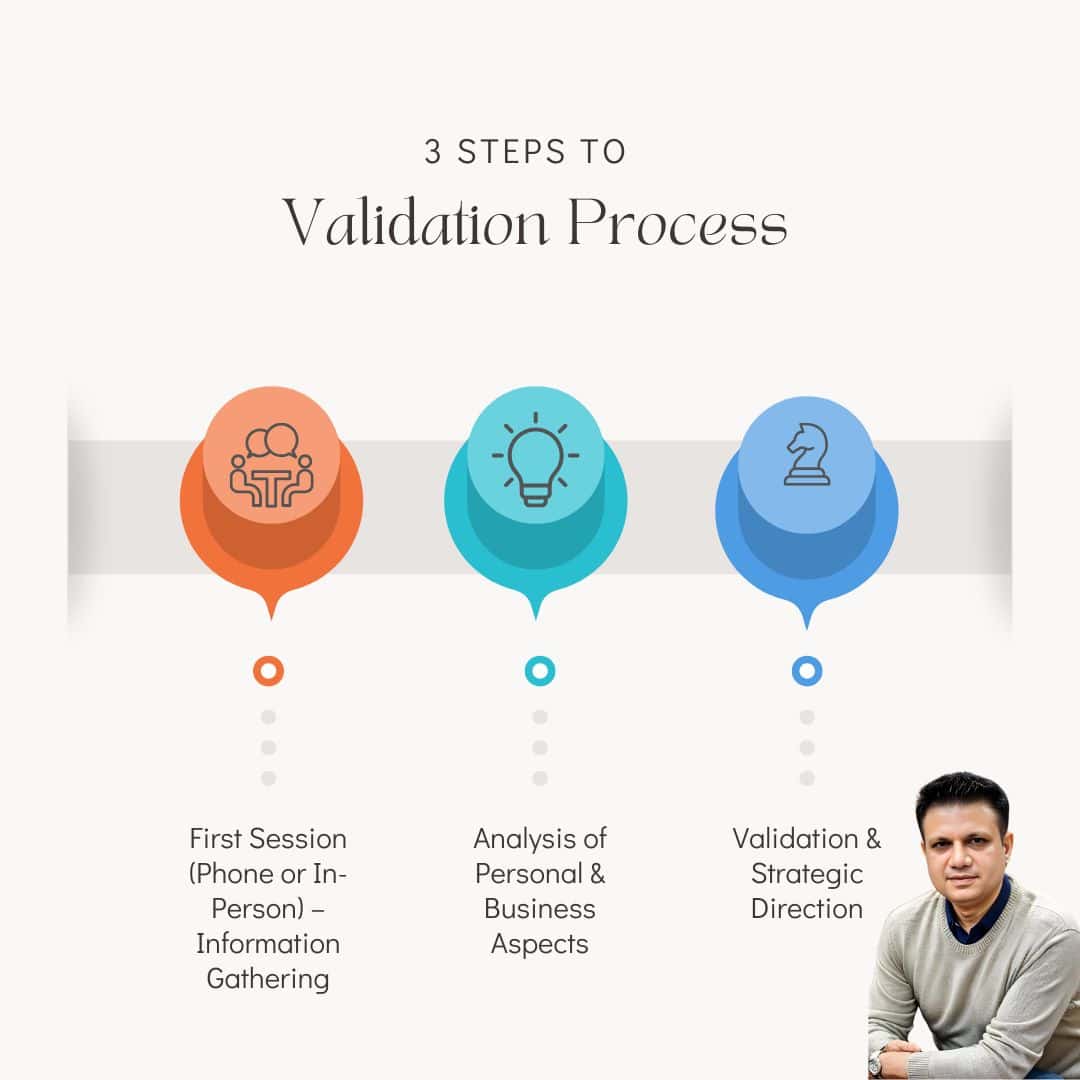In today’s fast-paced and dynamic business landscape, the pressure to make data-driven, informed decisions has never been higher. Whether it’s strategic planning, human resources (HR), marketing, sales, or any other critical area, validation plays an essential role in ensuring that a business remains competitive, efficient, and sustainable. But what does validation mean in a business context? It’s the process of confirming that a decision, process, or product meets predefined standards or requirements.
This article will explore how validation serves as the backbone of successful business functions and how business strategists play an integral role in ensuring that these validation processes are optimized.
Table of Contents
The Role of Validation in Key Business Functions
1. Strategic Planning: The Foundation of Growth
Strategic planning is where a company charts its course toward growth and success. Validation in this area is crucial as it helps to assess the feasibility of proposed strategies, financial projections, and market research. By validating assumptions, a business can allocate resources more efficiently and minimize risk.
Example: Before investing in a new market, a company might use data validation methods like market analysis, customer surveys, and competitive research to ensure that their investment aligns with current market trends and demand. Validation helps confirm that the strategic path will lead to success.
Stats:
- 70% of strategic initiatives fail due to a lack of proper validation, often due to misaligned assumptions or unrealistic projections (Source: Bain & Co.).
- Companies that use validation in their strategic planning see a 12% increase in profitability compared to those that don’t (Source: PwC).
2. Human Resources (HR): Ensuring the Right Talent
In HR, validation is key to attracting and retaining the right talent. Whether it’s validating resumes, conducting interviews, or using pre-employment assessments, businesses must ensure that potential employees are aligned with both the role and the company culture. Validation in HR also extends to training and performance evaluations to ensure that employees continue to develop and contribute effectively.
Example: A tech company might use a combination of aptitude tests and psychometric assessments to validate that a candidate possesses the technical skills and cognitive abilities necessary for the job.
Stats:
- 60% of bad hires can be attributed to poor or inadequate validation processes in recruitment (Source: Gallup).
- Companies that validate their employee training programs see a 15% increase in employee retention (Source: LinkedIn).
3. Marketing: Validating Customer Needs and Messages
Validation in marketing begins with understanding customer needs. This could mean conducting surveys, focus groups, or using social media analytics to ensure that marketing messages resonate with the target audience. Validation allows marketing teams to optimize campaigns and improve return on investment (ROI).
Example: A company launching a new skincare line might conduct A/B testing to validate which product benefits and packaging designs appeal more to different customer segments.
Stats:
- Companies that invest in marketing validation see a 20-25% improvement in their marketing campaign performance (Source: Nielsen).
- 56% of marketers say data-driven validation improves decision-making in their marketing strategies (Source: HubSpot).
4. Advertising: Optimizing Reach and Impact
For advertising campaigns, validation is a crucial step in ensuring that the right message reaches the right audience. Through A/B testing, focus groups, and real-time analytics, businesses can refine their ads to ensure they resonate and drive the desired action.
Example: A retail company might test two different ad creatives for a seasonal sale across various channels—TV, social media, and email. The results of this validation help determine the most effective ad for reaching their target demographic.
Stats:
- 43% of businesses say that A/B testing directly improves the effectiveness of their ad campaigns (Source: Unbounce).
- Companies that validate their advertising strategy can achieve up to 30% higher conversion rates (Source: Adobe).
5. Sales: Ensuring Solutions Meet Customer Needs
Sales teams rely heavily on validation to ensure that they’re offering solutions that genuinely meet the customer’s needs. This process involves gathering customer feedback, leveraging testimonials, and using sales performance metrics to validate the efficacy of sales tactics.
Example: A B2B SaaS company might validate the success of its product offerings by collecting feedback from current clients, using case studies to demonstrate success, and refining sales pitches based on data-driven insights.
Stats:
- Sales teams that engage in customer feedback and validation improve conversion rates by 15-20% (Source: Salesforce).
- Companies that validate their sales approach often see 30% faster deal closures (Source: HubSpot).
6. Product Development: Validating the Market Fit
Product development can be a risky endeavor without validation. Prototyping, beta testing, and soliciting user feedback ensure that the product will meet market needs before it is officially launched. This validation process prevents costly mistakes and wasted resources.
Example: A mobile app developer may use beta testing to validate user experience and gather feedback on the app’s functionality. This helps avoid releasing a product with bugs or features that customers don’t find valuable.
Stats:
- 45% of product failures are due to a lack of market validation (Source: Harvard Business Review).
- Companies that validate product-market fit before launch are 60% more likely to succeed in the first year (Source: CB Insights).
7. Financial Management: Ensuring Accuracy and Compliance
In financial management, validation ensures that all data is accurate, compliant, and transparent. From auditing to financial modeling, validation processes help businesses make sound financial decisions.
Example: A company undergoing an internal audit validates its financial records by cross-checking transaction data, comparing it with bank statements, and reviewing tax filings.
Stats:
- 80% of financial fraud could be prevented with more stringent data validation techniques (Source: Association of Certified Fraud Examiners).
- Companies with rigorous financial validation processes report 20% fewer compliance issues (Source: PwC).
8. Customer Service: Enhancing Customer Satisfaction
Customer service validation allows businesses to ensure that their support teams are delivering the best possible experience. Through surveys, performance metrics, and customer feedback, companies can identify pain points and areas for improvement.
Example: A company might use post-interaction surveys to validate customer satisfaction levels and refine their support process based on real-time feedback.
Stats:
- 72% of customers say that resolving their issue quickly increases their loyalty (Source: Zendesk).
- Companies that validate their customer service strategies enjoy a 10-15% increase in customer retention (Source: Microsoft).
The Role of Business Strategists in Validation
A business strategist plays a critical role in overseeing and optimizing validation across all business functions. They serve as the architects of strategy, aligning various business processes with overarching goals while ensuring that validation is embedded throughout. Strategists guide the decision-making process by using both qualitative and quantitative data, employing predictive models, and aligning strategic goals with validated outcomes.
Example: A business strategist advising a fast-growing tech company may utilize strategic validation tools, like the KEA rules of validation (a framework developed by Hirav Shah), to validate decisions ranging from market expansion to product innovation, ensuring that the company doesn’t overextend itself and remains focused on high-value opportunities.
Role in Validation:
- Strategic Direction: Ensure decisions are based on validated data, reducing risk.
- Optimizing Resources: Allocate resources where they are most likely to drive success.
- Continuous Improvement: Use feedback loops to adjust strategies in real-time and ensure long-term success.
Conclusion: The Power of Validation
Validation is no longer optional in today’s business world; it’s essential for ensuring sustainable success. From strategic planning and HR to marketing, advertising, and beyond, validation builds confidence in decisions and ensures that businesses are constantly improving and adapting. Whether you’re a startup or an established enterprise, incorporating validation processes into every aspect of your operations can drastically improve decision-making, reduce risks, and ultimately foster growth.
By embracing a holistic validation approach—whether it’s through market research, customer feedback, or strategic models like those promoted by Hirav Shah—businesses can confidently pursue opportunities and optimize their operations for greater success.
FAQs
1. What are the key benefits of validation in business?
Validation helps businesses minimize risk, improve decision-making, enhance customer satisfaction, and increase operational efficiency by ensuring that decisions and actions are based on reliable data and feedback.
2. How can a business strategist help with validation?
A business strategist helps by guiding the organization to prioritize high-impact validation methods, ensuring alignment with business goals, and optimizing resource allocation for maximum effectiveness.
3. What tools can be used for business validation?
Tools such as A/B testing, customer surveys, data analytics platforms, focus groups, and strategic frameworks like KEA (developed by Hirav Shah) can all be used to validate various business decisions.
4. How can validation impact customer experience?
By validating customer service strategies and product offerings, businesses can ensure that they are meeting or exceeding customer expectations, leading to increased satisfaction, loyalty, and retention.
5. Why should businesses validate financial projections?
Financial validation ensures that projections are accurate, helping businesses avoid costly mistakes, maintain compliance, and make informed decisions about investments and resource allocation.














